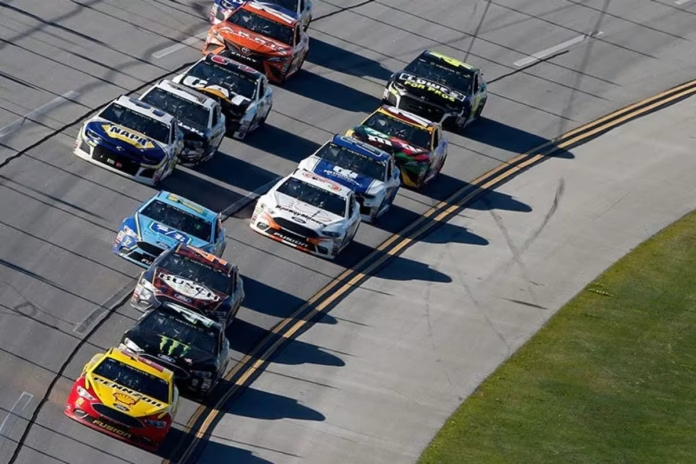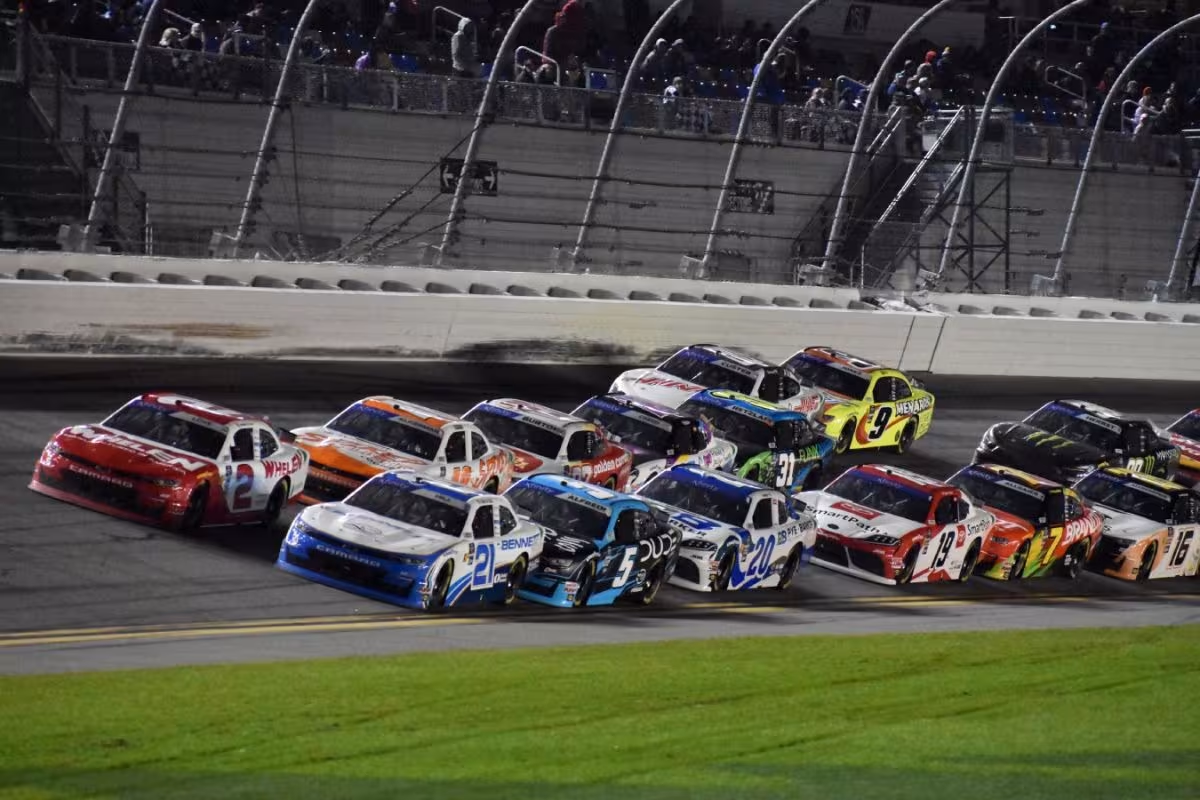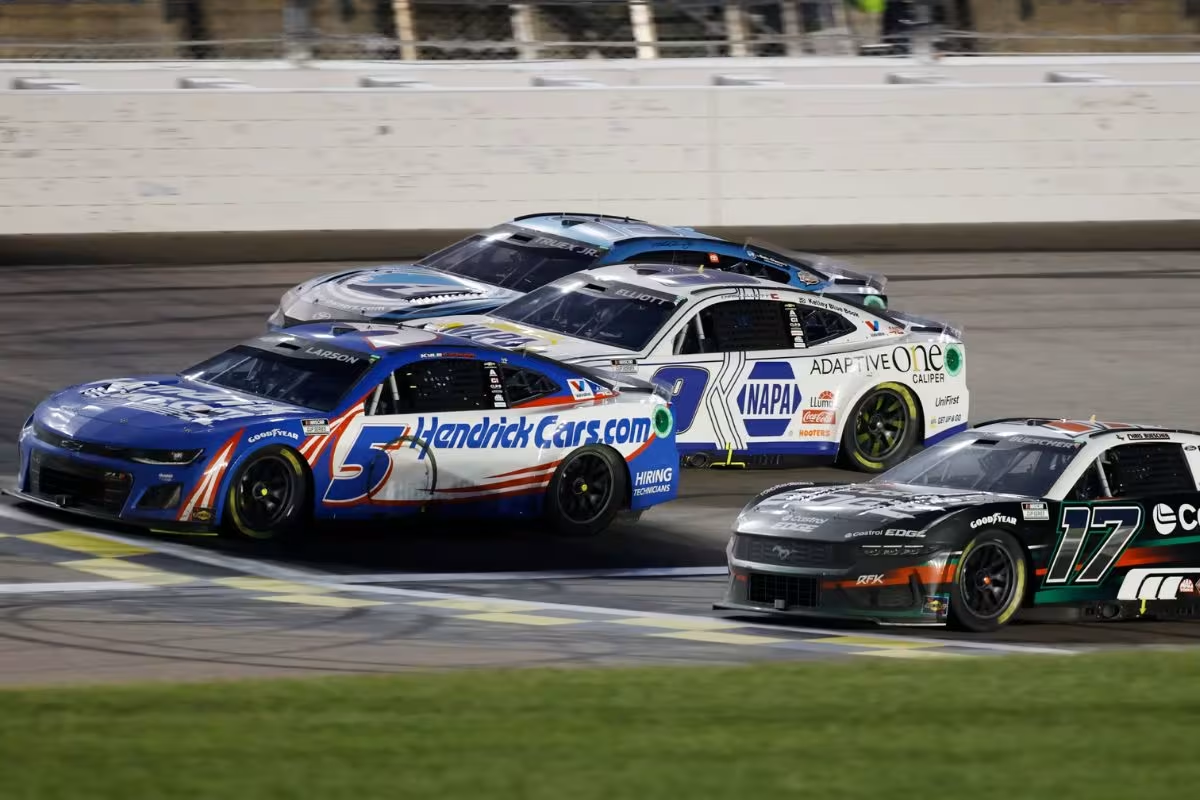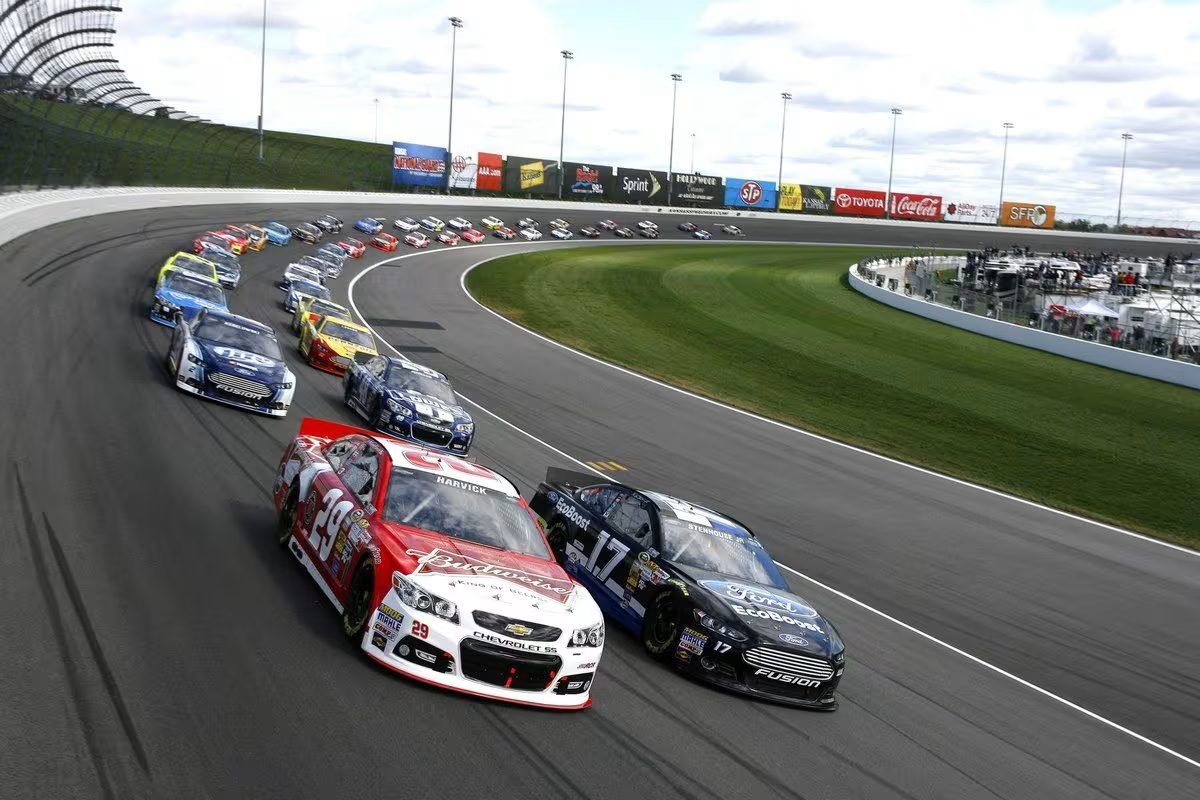Ford’s Talladega Dominance: Ford‘s remarkable success at Talladega raises intriguing questions about the factors contributing to its dominance over Chevrolet and Toyota. Central to this phenomenon is the interplay of exceptional teamwork and tactical adaptability, which seem to be ingrained in their racing culture. Moreover, the historical context of Ford’s achievements, highlighted by the performance of standout drivers, adds to their psychological edge during vital playoff moments. As we examine these elements more closely, one must consider how this intricate blend of fellowship and planning positions Ford not just for wins, but for sustained excellence in the highly competitive landscape of NASCAR.
Key Highlights
- Ford drivers benefit from a culture of cooperation, enhancing teamwork and communication compared to Toyota and Chevrolet.
- Historical dominance at Talladega includes ten victories, providing Ford with a psychological edge over competitors.
- Team Penske’s success, with multiple wins at Talladega, shows Ford’s strength in drafting and positioning strategies.
- Ford’s adaptability in race conditions allows for quick tactical adjustments, crucial during longer runs and changing circumstances.
- Tire management strategies employed by Ford drivers enhance performance sustainability, setting them apart in competitive long-distance races.
Ford Drivers’ Teamwork and Strategy
The unique fellowship among Ford drivers markedly improves their competitive edge in NASCAR, reflecting a tactical approach that prioritizes teamwork over individual achievement. This collaborative mentality manifests itself on race days, where the synergy between drivers not only optimizes performance but amplifies tactical execution.
Chase Briscoe’s assertion that Ford drivers exhibit superior teamwork compared to their Toyota and Chevrolet counterparts highlights a fundamental aspect of their success. By fostering a culture of cooperation, Ford has created a framework where drivers outside the playoff race actively support their playoff-bound peers.
“The Fords probably work together better than any other manufacturer and it’s because of that open line of communication.” – Briscoe
The organizational efforts by Ford to facilitate solidarity extend beyond the racetrack, with events designed to strengthen interpersonal relationships among drivers. Such initiatives cultivate an environment of mutual respect and shared goals, integral to fostering a unified front.
Briscoe’s reference to “One Ford family” encapsulates this ethos, emphasizing a commitment to collective success that transcends individual rivalry.
“We go do team events and driver-only events where all of us are together and it’s a One Ford family. And during the playoffs, you see the Fords outside of the playoffs make sure they’re doing everything they can to make sure the Fords that are in the playoffs have the best opportunity.” – Briscoe
Moreover, the open line of communication among Ford drivers strengthens their tactical capabilities. During critical moments in races, this seamless communication allows for real-time adjustments and coordinated efforts to optimize performance.
The willingness of non-playoff drivers to assist their playoff-bound teammates further exemplifies this cooperative spirit, ensuring that every Ford driver is invested in the collective outcome.
Performance Trends During Playoffs
Ford’s impressive teamwork during the regular season may not always yield the same level of performance as seen with Toyota and Chevrolet, yet this dynamic shifts dramatically as the playoffs approach. Historical trends indicate that Ford drivers exhibit a remarkable resurgence when the stakes are highest. In both the last two seasons, Ford teams showcased an uncanny ability to raise their game, demonstrating a competitive edge that often eludes them earlier in the year.
This playoff performance is likely attributed to a combination of factors, including tactical adjustments, heightened focus, and an innate drive to capitalize on playoff intensity. Unlike their rivals, Ford teams seem to welcome the stress of the playoffs, translating it into collective success on the track. The synergy among Ford drivers becomes palpable as they navigate the intricacies of race strategy, drafting, and pit stops with precision.
Moreover, the adaptability of Ford cars plays a vital role in this playoff resurgence. Engine modifications and aerodynamic tweaks, often implemented based on data gathered during the regular season, allow Ford teams to fine-tune their vehicles for peak performance at tracks like Talladega. This capacity for quick adaptation not only improves speed but also fosters a cohesive team dynamic, fundamental for success in high-stakes environments.
As the playoffs unfold, the anticipation builds around whether Ford can sustain this momentum against formidable competitors like Toyota and Chevrolet. The potential for thrilling races looms large, particularly at super speedways where teamwork and strategy are paramount.
Ford’s Record at Talladega
In relation to playoff racing, Talladega stands out as a stronghold for Ford, reflecting a legacy of dominance that few can rival. With a remarkable ten victories in the YellaWood 500, Ford has established itself as the team to beat during this vital segment of the NASCAR season. The reigning champion, Ryan Blaney, exemplifies this success, having succeeded in this race last year, serving as a catalyst for his championship run.
Team Penske, a cornerstone of Ford’s racing skill, has historically excelled at Talladega. Both Blaney and his teammate, Joey Logano, have each secured three wins at this iconic track, emphasizing their ability to navigate the complexities of restrictor-plate racing. Their achievements not only highlight individual talent but also reflect the tactical insight that Team Penske brings to the table.
As the Toyotas and Chevys aim to disrupt Ford’s dominance, they face an uphill battle. The unique dynamics of Talladega require not just speed but also a profound understanding of drafting and positioning, areas where Ford consistently excels. The synergy between the drivers and their teams improves their competitive edge, often translating into superior racecraft.
As playoff races unfold, Ford’s historical performance at Talladega serves as both a benchmark and a psychological advantage. With stakes higher than ever, their track record will certainly loom large in the minds of competitors, making it clear that beating Ford here is no small feat.
Title Contenders and Upcoming Challenges
Multiple title contenders are poised to make their mark in the upcoming YellaWood 500, with Ryan Blaney leading the charge as he seeks to defend his crown and secure his fourth victory at Talladega. Blaney’s impressive performance has established him as a formidable competitor, but he will face considerable challenges from his Ford teammates, all vying for a coveted spot in the round of 8.
As the race approaches, several key factors will influence the outcome:
- Team Dynamics: The collaborative efforts among Ford drivers could play a fundamental role. Effective drafting and tactical positioning will be essential for maximizing their collective strengths while minimizing the risks of individual errors.
- Tire Management: Talladega’s unique track conditions require adept tire management. Ensuring ideal grip over long runs can provide a considerable advantage, particularly during the closing laps when the stress mounts.
- Adaptability to Race Conditions: The ability to quickly adapt to changing race conditions—whether due to weather, accidents, or shifts in competition—will separate the contenders from the pretenders. Teams must remain vigilant and responsive to maintain their competitive edge.
As these drivers prepare for the intensity of the YellaWood 500, the blend of talent, strategy, and resilience will ultimately determine who emerges victorious.
With the stakes higher than ever, all eyes will be on Blaney and his competitors as they navigate the challenges ahead, each aiming to solidify their path to the championship.
News in Brief: Ford’s Talladega Dominance
Ford’s sustained dominance at Talladega stems from a combination of exceptional teamwork, tactical adaptability, and an intimate understanding of drafting techniques. The historical success of key drivers, coupled with their ability to communicate effectively and make real-time adjustments, solidifies their competitive edge over Chevrolet and Toyota. As the playoffs approach, this established legacy and psychological advantage may prove vital, positioning Ford as a formidable contender in the high-stakes environment of NASCAR racing.
ALSO READ: Ford’s 2024 Comeback: Ryan Blaney Eyes Back-to-Back Titles After Stunning Resurgence





